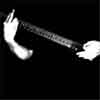 Austere delivery makes Dagonite everything it is. Aside from the obvious references to H.P. Lovecraft there are few if any embellishments on this record. That fact calls attention to Brown Jenkins' greatest strengths (raw simplicity and a strong sense of purpose) and weaknesses (raw simplicity).
Austere delivery makes Dagonite everything it is. Aside from the obvious references to H.P. Lovecraft there are few if any embellishments on this record. That fact calls attention to Brown Jenkins' greatest strengths (raw simplicity and a strong sense of purpose) and weaknesses (raw simplicity).
Moribund
All the ridiculous associations that mar the face of black metal are absent on Dagonite; faux-Satanism, church burning, sexual brutality, and macho-posturing are all thankfully absent from Brown Jekins' music. Any preoccupation with these topics is either implied by genre association or veiled in the personality of the musicians responsible for these five songs. There is no lyric book, no evangelical declaration of purpose, and few discernible lyrics to get in the way of this record's one and only focus: the guitar.
"Blessed" begins the album with a wash of fuzzed out guitars layered into a cacophonous haze of smoke and electricity. Once the echoey growls make their appearance the rhythm section kicks in and the propulsive power of this project announces itself. It is when these songs develop a sure sense of direction and motion that they become most enjoyable and imaginative. Brown Jenkins produces a tangible tension simply by pulling songs through distinct tempo changes and rhythmic themes. Constant shifts between slow, spacious melodies and fast, highly energetic rhythms cultivate a sense of unpredictability at first, but this shifting shows itself over and over again on each song and eventually transforms into a predictable technique. Nevertheless it is by virtue of this technique that each song progresses smoothly and without any recourse to an instrument other than the guitar. If Brown Jenkins makes any esthetic claims through their music, it's about the purity of the guitar and what it alone is capable of producing.
While the slower moments help to generate anticipation for the next punk or kraut-like section, they tend to be less threatening or severe and more ethereal. At some point during "Dagonite" a medium-tempo guitar solo makes its way through the mix just before a vocal eruption is let loose. The aftermath is another "walking" or choppy rhythm that gives rise to a sense of quick and desperate motion, as though the album has a narrator whose quick and breathless speech can only be approximated by the guitar's stuttered expressions. I'm left wondering why Brown Jenkins even bothered with solos or extended doom-like passages. The group is clearly most at home when they're going someplace, not simply delaying the next movement with a sludgy repose.
The group's naked austerity is undoubtedly their greatest asset. This album may be nothing more than five songs of guitar worship shaped into atmospheric plague, but those five songs accomplish a directness and sense of dread that most other bands fail to achieve with twice as many instruments in their arsenal. Potent black metal doesn't need to be carried to theoretical or theatrical extremes to be effective. Brown Jenkins took little more than a few guitars, some very simple percussion, restraint, and a love for horror fiction and turned it into one of the better black metal records I've heard since first hearing the patriarchs associated with the genre.
samples:
Read More

